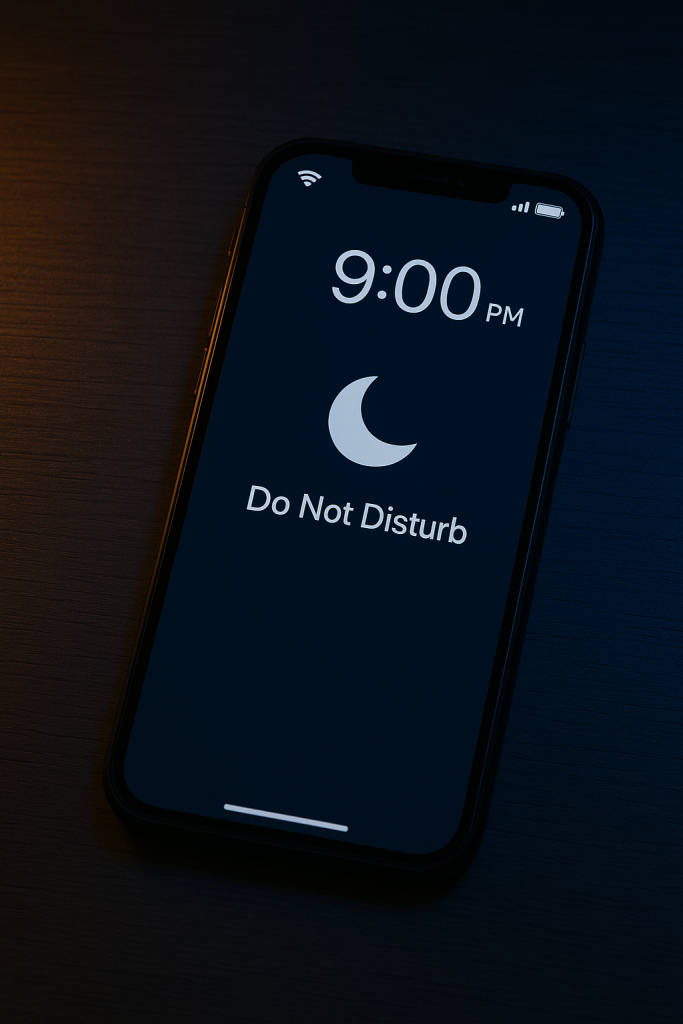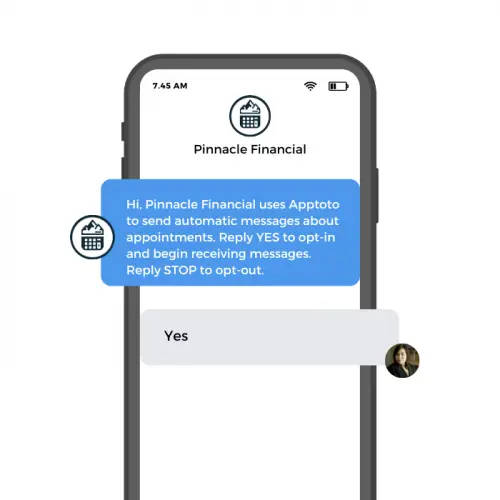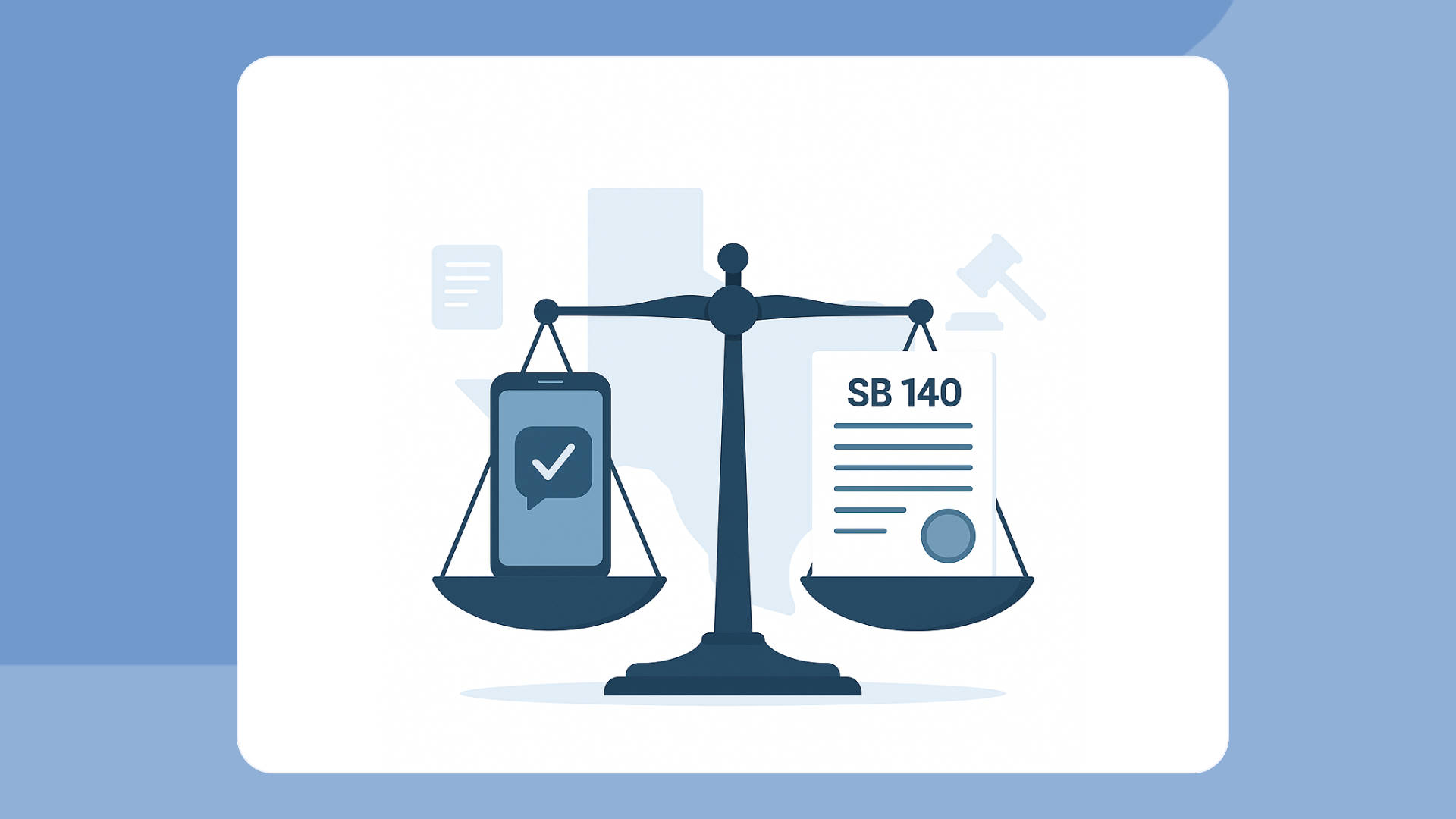Estimated reading time: 1 minute
If you rely on texting to connect with customers in Texas, there’s a new law in effect that could impact how you send messages in the future.
Texas Senate Bill 140 (SB 140) went into effect on September 1, 2025, and officially expands the definition of “telephone solicitation” to include any SMS text, multimedia (MMS), or rich communication service (RCS) message intended to promote a product or service. That means what used to be a simple marketing text (“Book now for 20% off your next service!”) now carries the same compliance requirements (and potential penalties) as a telemarketing call.
Your texts are likely still compliant if you use Apptoto for appointment reminders. However, if you include promotional language in reminders or campaigns, review the guide below to understand the new text marketing rules for Texas consumers—what they mean, who they affect, and how to stay compliant.
Texas’s Telemarketing Law & Text Messaging: A Quick Summary
Texas law SB 140 (also known as Texas’s mini-TCPA) updates the state’s telemarketing laws to protect consumers against unwanted messages from modern communication channels. Historically, telemarketing referred to phone calls made to solicit sales or promote products and services. Now, it also includes SMS, MMS, RCS, and similar text-based transmissions.
In plain terms: if your business texts Texas residents for marketing or promotional purposes, those texts are now regulated the same way as telemarketing calls.
Transactional messages (such as appointment confirmations or reminders) are still allowed, but you must ensure they are purely informational and not promotional in tone. If your client messages include a promotion or discount alongside your reminders, things can get murky. In that case, those messages could be treated as solicitations under the new law.
What SB 140 Specifically Changes
Under SB 140, the term “telephone solicitation” now covers “a call or other transmission, including a transmission of a text or graphic message or of an image, initiated by a seller or salesperson to induce a person to purchase, rent, claim, or receive an item.”
That’s legislative speak for: marketing texts count as solicitations.
Affected Channels
- SMS (standard text messages)
- MMS (messages with images or media)
- RCS (rich messaging)
- Any similar electronic format
Apptoto Use Cases: Transactional vs. Marketing Texts
✅ Appointment Reminders (Transactional)
Appointment reminders like “Your dental cleaning is tomorrow at 10 a.m.” are generally considered safe.
They are transactional messages, not solicitations, when they:
- Confirm or update an existing appointment
- Provide logistical details (time, location, preparation steps)
- Offer rescheduling links or two-way communication
🔸 Avoid adding marketing language such as “Don’t forget to ask about our whitening special!” That turns a compliant reminder into a solicitation.

⚠️ Campaign or Promotional Texts (Marketing)
Apptoto’s Campaigns feature, when used specifically for promotions or discounts, may fall under SB 140.**
Texts are marketing messages when they:
- Share promotions or specials: “20% off whitening treatments this month!”
- Announce new services or events: “Now offering same-day appointments!”
- Share announcements without being opted in to. “Join us for our Fall Open House!”
**You may qualify for an exemption (meaning you can send marketing text to clients) if you’ve been in business for over two years and are reaching out to current or former customers. It is crucial to consult with your attorney if you are not 100% sure whether you qualify for an exemption.
The Core SB 140 Compliance Requirements
Registration
Unless your business qualifies for an exemption, companies that send marketing text messages to Texas residents must:
- Register with the Texas Secretary of State by submitting Form 3401.
- Pay a $200 annual registration fee.
- Provide a $10,000 security deposit, which can be in the form of a surety bond, certificate of deposit, or letter of credit.
Quiet Hours

No solicitations can be made before 9 a.m. or after 9 p.m. (recipient’s local time).
Do-Not-Call Rules
Businesses must scrub their marketing lists against the Texas and Federal Do-Not-Call registries.
Consent & Opt-Out

Businesses must receive explicit consent to send customers marketing texts. “STOP” replies must be honored immediately. You must maintain clear records of when customers granted consent.
Identification
Messages must clearly identify the sender or the business sending the text.
Who Must Comply
The new law applies to any business or salesperson marketing to Texas residents, even if your company isn’t located in Texas.
If you send marketing messages to Texas phone numbers or customers with Texas addresses, your business is likely in scope.
You may need to register as a telephone solicitor under Chapter 302 of the Texas Business & Commerce Code, unless you qualify for one of the narrow exemptions listed below.
Exemptions
Some businesses and organizations are excluded from Texas SB 140’s registration and solicitation requirements. These exemptions are narrow, so it’s essential to verify whether your business qualifies.
Former or Current Customers: Companies that are reaching out to former or current customers, and that’ve operated under the same business name for at least two years.
Maintenance/Repair: Businesses offering maintenance or repair services for previously purchased items.
Educational Institutions and 501(c)3s: Educational organizations and nonprofits.
Already Regulated Businesses: Public companies, licensed insurers, banks, utilities, or FCC-regulated entities that have different solicitation requirements outlined in their own unique regulations or laws.
Isolated Solicitations: Businesses may be exempt if they send a one-time message that isn’t part of a repeated pattern.
The list above does not include all of the exemptions. To see all exemptions and confirm if your business qualifies, visit the Texas Business & Commerce Code §302 Exemptions.
What if my business doesn’t comply with the new regulations?
If your business fails to meet the requirements above (and doesn’t qualify for an exemption), you may face:
- Civil penalties of up to $5,000 per violation
- Additional $25,000 to $50,000 fines for continuing to send illegal solicitations
- Lawsuits under the Texas Deceptive Trade Practices Act (DTPA)
- Potential criminal liability for serious or repeated violations
Best Practices for Apptoto Users
1. Segment Your Contacts
Use Apptoto address books or contact groups to segment Texas recipients and use Texas-specific sending rules.
2. Schedule by Time Zone
Configure appointment and campaign sends to honor Texas quiet hours (9 a.m. to 9 p.m.).
3. Separate Workflows
Keep reminders transactional and avoid adding promotional language, as this could be construed as marketing.
4. Use Built-In Consent Collection
Enable initial opt-out, or double-opt in to automatically collect consent from your customers to send them text messages.
4. Maintain Records
Utilize Apptoto’s logs and stoplists to monitor consent and message opt-outs (i.e., when a client replies “STOP” to a text message).
5. Audit Content Regularly
Review templates and campaigns quarterly to ensure no promotional content slips into transactional flows.
Common Questions
Yes. The law covers solicitations to Texas residents, not just from within Texas.
Yes—but still only between 9 a.m. and 9 p.m. local time.
Are healthcare reminders exempt?
Generally, yes if they’re strictly informational and not marketing-related. When in doubt, keep them purely transactional.
Re-engagement or “win-back” texts are likely solicitations unless you meet a specific exemption. Proceed with caution and consult with legal counsel if needed.
Keeping Your Messaging Strategy Compliant Under SB 140
SB 140 aligns Texas with other states’ “mini-TCPA” laws, extending telemarketing rules to text messages and other digital messages. Consumers now have stronger rights and the power to take action for violations, while businesses face clearer compliance duties.
For Apptoto users, the good news is that our platform already supports many of the compliance practices you’ll need, including message scheduling, consent management, opt-outs, and record-keeping. It’s simply a matter of reviewing your use cases and refining processes where necessary.
Next steps:
- Verify whether your organization is required to register as a telephone solicitor in the state of Texas.
- Segment your Texas contacts.
- Review all Apptoto reminder and campaign templates.
- Train staff on the distinctions between transactional and marketing messages.
- Consult your legal counsel for specific guidance.
Need help?
Contact our team to review your setup and ensure your text messaging remains compliant under the new Texas law.
This article is for informational purposes only and does not constitute legal advice. For advice on your specific circumstances, please consult your attorney.



